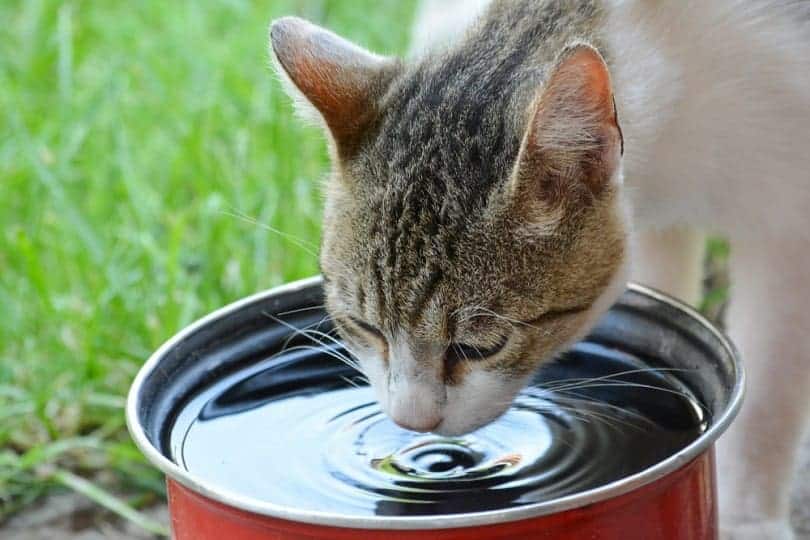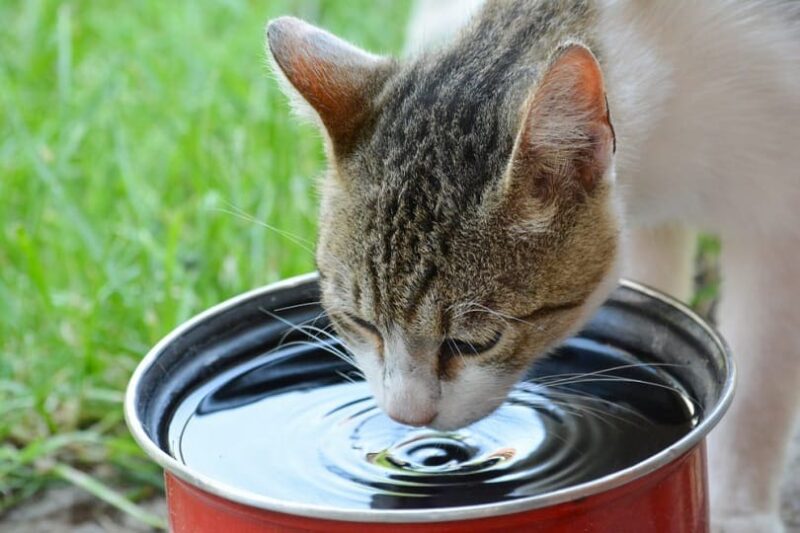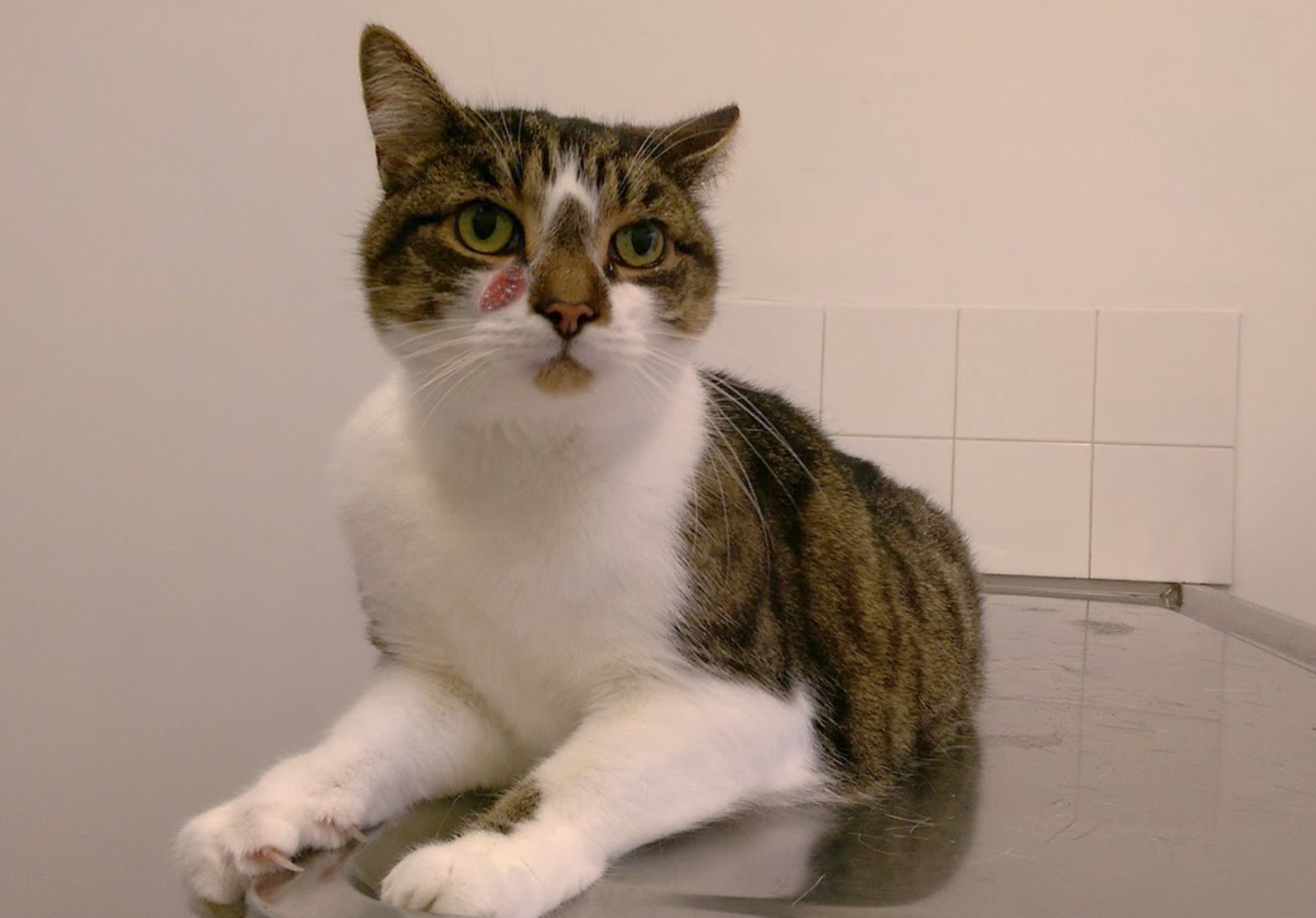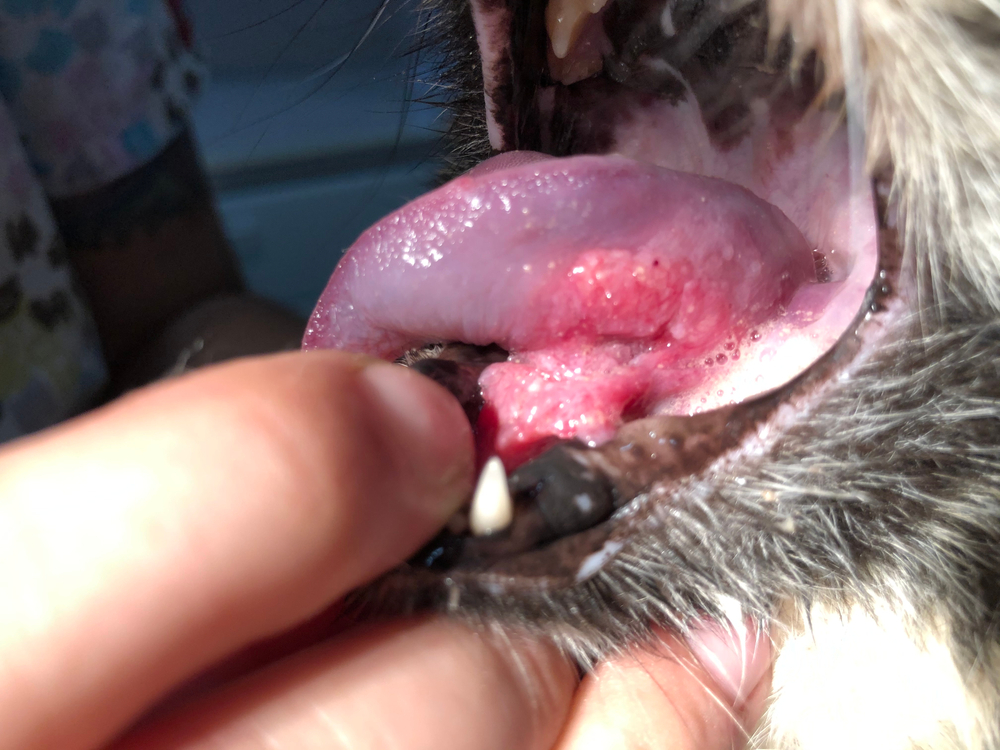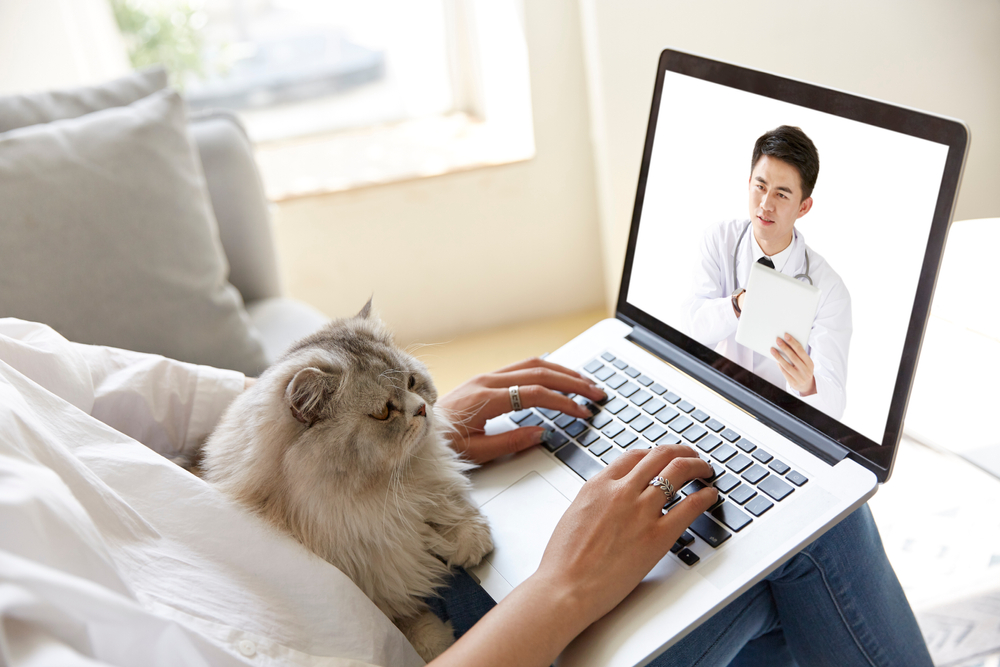One of the best ways you can love your feline friend is simply to watch them: watch what “normal” looks like, watch what they eat, when they drink, how they move, whether they come to you demanding a fuss or keep to themselves. Most of all, note any change. Change may be the warning sign that your cat needs to visit the veterinarian’s office to be checked over.
So, what if you’ve noticed your cat is at the water bowl more often? Or drinking in new places? Have you found yourself refilling the bowl, yet again? To see if there could be a simple explanation, let’s start with some facts:
Do Cats Need a Lot of Water?
A cat body will meet its needs by drawing from the water drunk, from other liquid treats such as cat milk or gravy, and from water in food.
The ancestors of our domestic cats evolved in the desert, able to survive by catching their prey and with limited water resources. They have changed remarkably little in the thousands of years since and – while it’s still vital always to provide them with fresh, clean water – in good health, most cats drink sparingly.
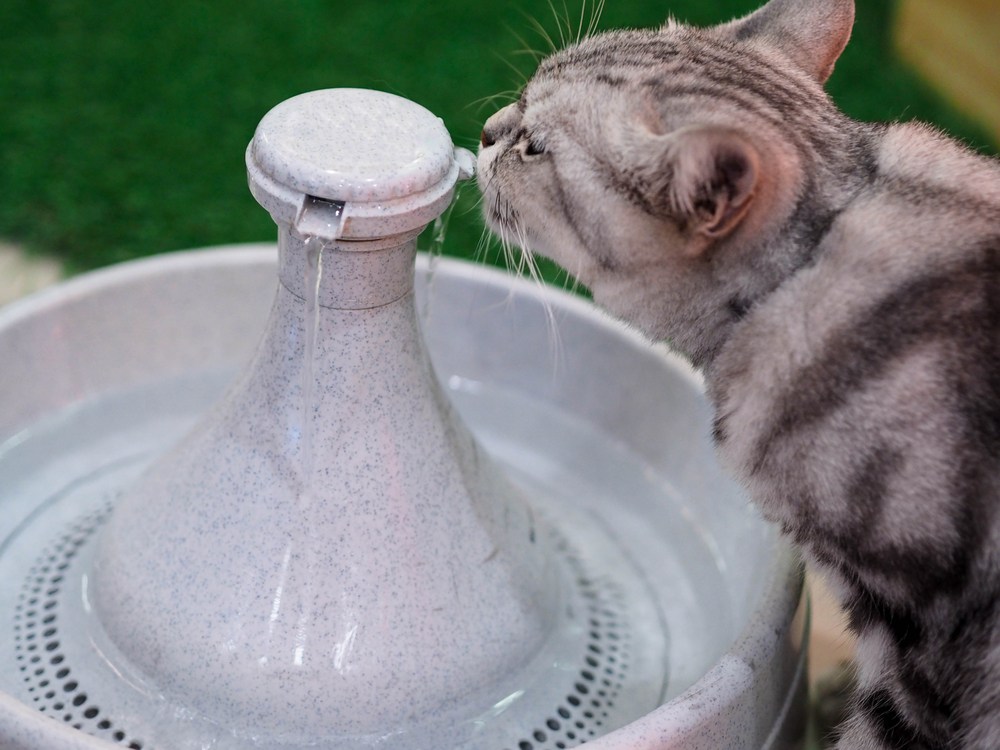
How Much Water Is in Cat Food?
How much water is in food depends on which format you give. Dry food kibbles are actually 5 to 10% water, while wet foods – whether loaf or stew – are nearer 80% water. That’s why cats who are eating wet foods may rarely be seen at their water bowl, as most of their needs are being met from their dinner. Kitties who dine on kibbles are likely to drink noticeably more.
If you have recently changed the feline menu from wet to dry food, you can expect to see more forays to that bowl to compensate.
Feeding your cat a high-quality diet is important for keeping them healthy and happy. But it goes beyond the food you choose; the dishes they use also matter. The Hepper NomNom Cat Bowl is our favorite for its unique, five-star design that protects from whisker fatigue and promotes good posture which also aids in better digestion. As an added bonus, it’s beautifully crafted and offers a modern take on the traditional cat bowl that fits seamlessly with all home stylings. Learn more about the NomNom by clicking here. At Catster, we’ve admired Hepper for many years and decided to take a controlling ownership interest so that we could benefit from the outstanding designs of this cool cat company!
Do Cats Drink More in Hot Weather?
Cats don’t sweat as we do, nor pant like dogs, though they may groom more in warm weather so that their dampened coat helps them cool off by evaporation. And we all need more water to prevent dehydration in hot temperatures, but unless there’s been a sudden heatwave, it’s unlikely that you’ll see a marked change in how much your cat is drinking just because of a warm spell. Stay alert to other possibilities and, if in doubt, schedule a check-up with your vet.

If you need to speak with a vet but can’t get to one, head over to PangoVet. It’s an online service where you can talk to a vet online and get the personalized advice you need for your pet — all at an affordable price!
Why Is My Cat Drinking So Much Water?
If you don’t find a likely explanation above – and even if you do, keep a careful watch – it’s time to turn to more serious matters. An increase in drinking – vets call this polydipsia – can certainly be a sign of illness. Here we look at three common causes in some detail. In every one of these, being seen by your veterinarian sooner rather than later will give the best outlook for your pet’s health and comfort.
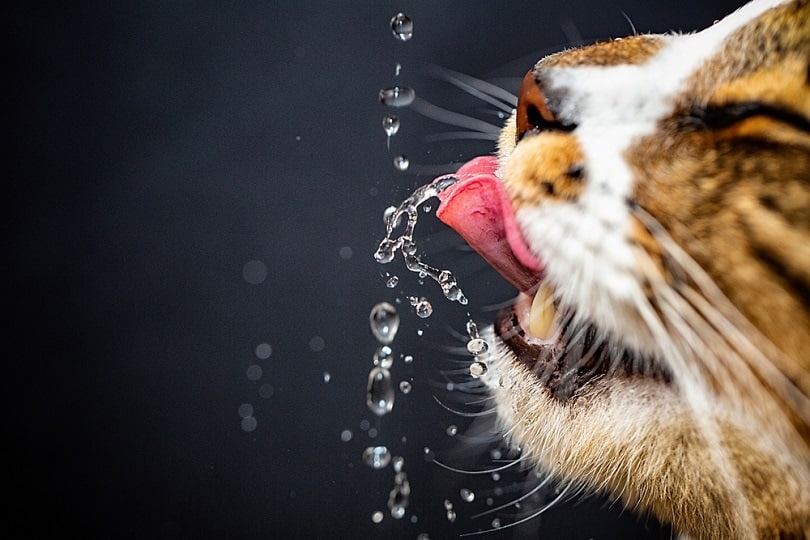
Cat Chronic Kidney Disease
Though the ‘chronic’ in the title means this condition develops slowly, the signs may seem to appear quite suddenly. It’s most often seen in older cats, though in Persians – and occasionally in Himalayans and British Shorthairs – a hereditary condition called polycystic kidney disease can cause mid-life problems.
An increase in drinking is often the first thing you notice. This is a response to increased urine output, as failing kidneys lose the ability to concentrate urine. You may see your cat making more frequent visits to the litter tray, or leaving larger volumes in the tray.
As the damage worsens, new signs reflect the kidney’s role as a detox unit: a gradual loss of weight, an increasingly picky and poor appetite, perhaps some vomiting, and just being less bright and interactive.
Cat Diabetes Mellitus (sugar diabetes)
Drinking more is usually the first and principal sign of Diabetes Mellitus. The sugar referred to in the title is more accurately called glucose; in this form of diabetes, the body fails to produce or to respond to insulin, which causes blood glucose levels to rise. The excess glucose spills out through the kidneys into the urine, taking water with it. Passing more water means drinking more water.
Cats are usually middle-aged before they suffer from this; it’s more common in males than females, more common in neutered cats, and most common in overweight and idle cats – indoor couch potatoes in particular.
Unlike the kidney cases with their picky appetite, these cats are generally bright and with a good or a hearty appetite, though they may be losing weight. Only in advanced stages do these pets become very poorly; the term “ragdoll” is used to describe the toxic, floppy, collapsed appearance of a late-stage diabetic cat.
This is one condition where seeking prompt veterinary attention can really pay off, as treating in the early stages can sometimes bring about remission, the so-called honeymoon period of diabetes.
Cat Hyperthyroidism
If the thyroid gland goes into overdrive, producing an excess of thyroid hormones, multiple changes result. A typical hyperthyroid cat is bright – sometimes rather hyperactive, even a bit tetchy – eating very well and sometimes manically hungry, yet is losing weight. He’s often looking scruffy with a matted coat, perhaps growing long, thick nails, and more vocal – positively yowling sometimes. He’s often drinking more and may have some vomiting or diarrhea.
This is an older cat’s disease. It’s rarely seen in cats under 8 and much more common in the oldies of 12 and over. Note that not all cats show all of these signs, and a small number are rather quiet and withdrawn.
What To Do When Your Cat Drinks a Lot of Water Suddenly
If you’re sure your cat is drinking more, take action:
- Ask yourself when this began and make a note of other changes
- Make sure the bowls never run dry, especially in warm weather
- Make sure your cat can always get to that water – don’t leave home having closed off the access
- Schedule a call to the vet’s office
What Will My Veterinarian Do if My Cat Is Drinking More?
Drinking more is a sign of problems but it’s not specific to any one problem.
Your vet will take a history from you, which is where your observations of what has changed and when help. Think back over recent months, considering appetite, body weight, any vomiting or diarrhea, and the kitty’s general “wellness”.
The vet will perform a full clinical examination and will need to sample blood and urine to screen for the diseases mentioned and other, less common causes. They may recommend ultrasound or other forms of diagnostic imaging.
FAQ: Cat Drinking a Lot of Water
Do cats need a lot of water?
Let’s do the math to answer that question in more detail. A well cat generally needs less than one fluid ounce for each pound body weight every 24 hours, so around 6 to 7 ounces for an 8-pound cat and 12 to 14 ounces for a 16-pound cat.
Note this is the total fluid requirement, so some of this will be drunk and some taken in food or produced internally. Remember too that so-called ‘wet foods‘ are so wet that an 8lb cat, eating these alone, might only drink a mere fluid ounce of water a day, while the same cat eating dry food would drink 5 times that amount.
Needs will also vary a little according to the conditions, with more water required in hot weather.
Can drinking more be a sign of poisoning in cats?
Cats are fastidious eaters and as a rule carefully inspect food before eating – unlike their see-it, eat-it canine companions. Sadly, there are occasions when they accidentally take in poison, perhaps from baited food, or by grooming themselves clean of pollens from the Lily family.
If sudden kidney failure results from such poisons, you may see excessive thirst as the first sign. More often, there are more immediate and dramatic signs, such as drooling, vomiting, twitching, or collapse.
See Also:
- Why Does My Cat Drink Water With Their Paw? – 4 Possible Reasons
- Cat Drinking a Lot of Water & Meowing? Vet-Reviewed Concerning & Harmless Reasons
Featured Image Credit: AleksandarMilutinovic, Shutterstock

